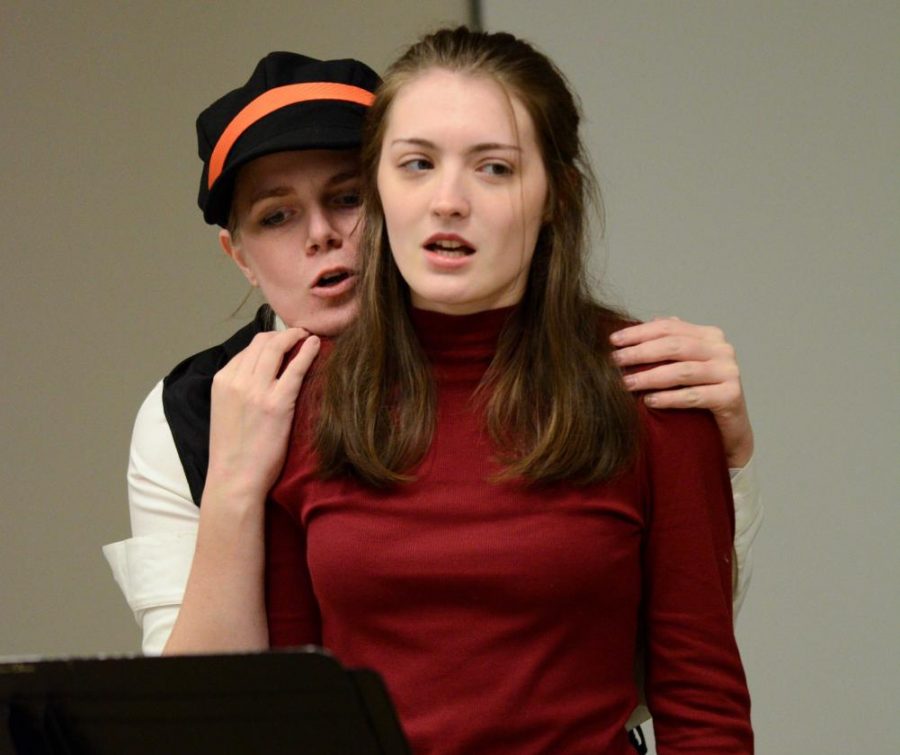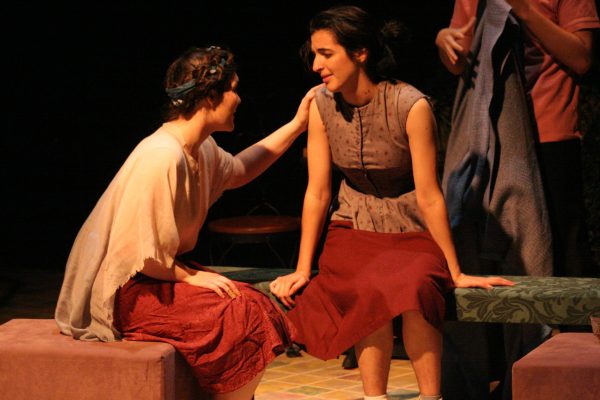“Women of Will” Strikes Socio-Political Chord
Students premiere a staged reading of College senior Sam Marchiony’s original one-act play, Women of Will, a feminist take on Shakespeare’s plays and female characters.
Editor’s note: This article contains mentions of sexual and physical abuse.
Women of Will, an original one-act play written and directed by College senior Sam Marchiony, premiered as a staged reading in StudiOC last weekend. The play — produced by an all-female cast and crew and written entirely in iambic pentameter — featured six of William Shakespeare’s female characters: Rosalind from As You Like It (Marchiony), Lavinia from Titus Andronicus (community member Aliza Weidenbaum), Hero from Much Ado About Nothing (College first-year Lucie Swenson), Imogen from Cymbeline (College sophomore Leah Treidler), Katherine from The Taming of the Shrew (College first-year Sofie Rejto), and Isabella from Measure for Measure (College sophomore Samantha Brooks). With a fiercely feminist, intensely academic script, the production seemed right at home on the Oberlin campus.
The initial concept of the play came to Marchiony when she was acting in Measure for Measure with the Commonwealth Shakespeare Company during the summer of 2016 and watched Cymbeline. Marchiony noticed feminist themes in those plays and was intrigued by the ways that the female characters were written and portrayed. A few months later, the infamous Donald Trump Access Hollywood tape came to light and Trump was elected to the presidency, leaving Marchiony with a buildup of, as she put it, “toxic feelings.”
At the time, Marchiony was taking a Shakespeare class and noticed misogyny — at times strikingly clear — in the Bard’s plays. But Shakespeare is also considered by many a feminist for his time because of the strong, complex female characters he crafts in his work — a radical choice for the 1600s. Noticing all of these aspects of Shakespeare’s depictions of women, Marchiony wrote Women of Will during her Winter Term last year.
The play centers around the stories of Lavinia, Hero, Imogen, Katherine, and Isabella, with Rosalind acting as a puppet-master who brings them together. The five women tell their stories as Rosalind sets the scene and then proceeds to play the men who hurt the women. Hero tells her story about how no one believed her account of her relationship. Hero is innocent, and though she would not do anything to hurt the man she loves, he still accuses her of sleeping with another man. For Isabella, the acceptance of silence as consent is a major issue. When a powerful duke asks for Isabella’s hand in marriage, she responds with silence, and everyone believes that is an affirmation of her agreement — though she actually wanted to become a nun. She questions the power dynamics at play in her life with the line, “Who dares challenge he that rules us all?”
Spousal abuse features heavily in Katherine’s part as well. Despite her sharp wit and her verbal barbs that she uses to lash out at other women, she is scarred by her abusive husband who had attempted to harness her. Though The Taming of the Shrew is most often billed as a comedy, Marchiony and Rejto bring out the truly disturbing moments of Katherine’s relationship with her husband that have been garnering laughs for centuries.
Imogen’s story, like Hero’s, involves a man she loves who believes that she is unfaithful — and then is murdered, leaving Imogen to tell a tale of loss and lies. Finally, Lavinia represents a pawn. She is murdered in her story to pain her father, and laments in Women of Will that she is not truly remembered as an individual — only as a daughter.
By uniting characters from different stories and allowing their stories and personalities to engage with each other, Women of Will affords new agency to these fictional women.
“[It takes] a bunch of female characters out of their elements and [puts] them together,” Brooks said. “[Marchiony] extended the life of Isabella past what Shakespeare says in his work.”
Both College first-year and Assistant Director Ellie Loane and Brooks mentioned what a unique and amazing experience it was to work directly with the creator of a work that they are acting in.
“[Marchiony] examines every single character trait and all these interactions between all these different characters and isolates the women,” Loane said. “She puts them on a pedestal that they have never been on before, and what I really love … is that it features female characters in Shakespeare that are often neglected and not as well-known.”
Marchiony, Brooks, and Loane all agreed that the play seemed very apt in the current climate of the U.S.
“I did not expect the play to feel quite so timely when it went up, … but I think that just means I’ve hit on something.” Marchiony said.
Recently, a number of stories about powerful, wealthy men who have been accused of sexual assault have gained wide popular media attention; Harvey Weinstein, Louis C.K., Kevin Spacey, Roy Moore, and, most recently, Senator Al Franken, to name a few. Women of Will offers a long, hard look at contemporary and historical treatment of women, offering an empowering message that, although cliché at times, is as necessary now as ever.
“The underlying theme [of the play] is that women should be united, and [that] we need each other.” Loane said.
Women of Will provides a necessary fresh take on well-debated topics, and it comes at a time when it could not be more pertinent. It was inspiring, thought-provoking, and left some of the audience in tears. In the author talk that she gave after Sunday night’s performance, Marchiony discussed the possibility of a second act for Women of Will. One can only hope that she, among others, will continue to uplift the voices of women who have historically been silenced and find in their interactions even more moments to listen honestly to shared pain and celebrate hidden triumphs.








